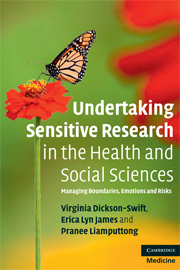 Undertaking Sensitive Research in the Health and Social Sciences
Undertaking Sensitive Research in the Health and Social Sciences Book contents
- Frontmatter
- Contents
- Preface
- Acknowledgements
- About the authors
- 1 What is sensitive research?
- 2 Doing sensitive research: methodological, theoretical, ethical and moral perspectives
- 3 Conducting a sensitive research project
- 4 Managing boundaries in sensitive research
- 5 Emotions and sensitive research
- 6 Managing risks and ethics in research
- 7 Implications and recommendations for researchers
- References
- Index
- References
2 - Doing sensitive research: methodological, theoretical, ethical and moral perspectives
Published online by Cambridge University Press: 11 September 2009
- Frontmatter
- Contents
- Preface
- Acknowledgements
- About the authors
- 1 What is sensitive research?
- 2 Doing sensitive research: methodological, theoretical, ethical and moral perspectives
- 3 Conducting a sensitive research project
- 4 Managing boundaries in sensitive research
- 5 Emotions and sensitive research
- 6 Managing risks and ethics in research
- 7 Implications and recommendations for researchers
- References
- Index
- References
Summary
Knowledge is subjective, constructed and based on the shared signs and symbols that are recognized by members of a culture. Multiple realities are presumed, with different people experiencing these differently.
(Grbich, 2007:8)In any piece of research, it is typical that we should include the theoretical framework that we base our research on. This is the main focus of this chapter. In this chapter, we will first discuss the theoretical issues relative to choosing a methodology. We will examine the methods literature relevant to the qualitative/quantitative debate and discuss the decision to adopt a qualitative methodology for the study of researchers' experiences of undertaking sensitive research. We will also discuss the issues of intrusion, ethical, moral and legal issues in the second part of this chapter.
Debates in the philosophy of science
In designing this study, it was important for us to examine a number of ontological and epistemological questions that underlie how research is conducted. The ontological question revolves around a discussion of whether or not there is a single objective reality (Denzin & Lincoln, 2005a). The epistemological question relates to the nature of knowledge and how knowledge can be obtained (Guba & Lincoln, 1994). In many of the classic texts, there is an argument about whether or not social science research can be objective (see Daly, 2007; Denzin & Lincoln, 2005a; Grbich, 2007; Willis, 2007). Max Weber (1949) maintains that social science could be value free.
- Type
- Chapter
- Information
- Undertaking Sensitive Research in the Health and Social SciencesManaging Boundaries, Emotions and Risks, pp. 15 - 32Publisher: Cambridge University PressPrint publication year: 2008


